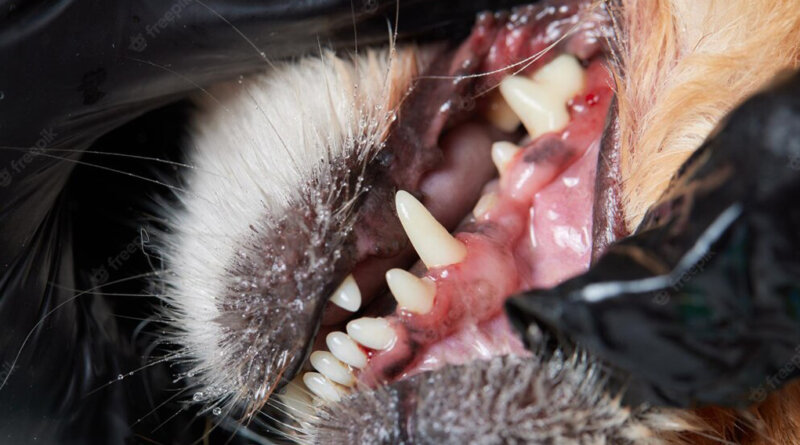9 Best Dog Gum Infection Home Remedies – Top Dog Tips
Does your dog have bad breath? Wondering what you can do to remedy this situation?
Chances are your dog has a gum infection. We’re here to help you tackle this problem from the comfort of your home.
Gum disease, also known as periodontal disease, is a common condition in dogs caused by a buildup of bacteria on the teeth and gums.
These bacteria can cause inflammation, pain, and even loss of teeth if left untreated.
While it is important to see a veterinarian for proper diagnosis and treatment, some home remedies can help to alleviate your dog’s symptoms and promote healing.
Dog Gum Infection Home Remedies: Dental Hygiene Is Key
Dental hygiene is the key to preventing dog gum infections.
Just like humans, dogs can develop dental problems such as tooth decay, periodontal disease, and other infections if their teeth are not properly cared for.
Here are three tips for maintaining your dog’s dental health:
1. Brush Your Dog’s Teeth
One of the easiest ways to maintain your dog’s dental health is to brush its teeth regularly.
You can use a toothbrush and toothpaste designed for dogs, which are available at most pet stores.
It’s important to use toothpaste specifically designed for dogs, as human toothpaste can be harmful if ingested.
To brush your dog’s teeth, simply lift their lip and gently brush their teeth and gums in a circular motion.
Be sure to brush all your dog’s teeth, including the back ones.
If your dog does not like having its teeth brushed, don’t worry.
It’s common for dogs to be hesitant about having their teeth brushed, especially if they’re not used to it.
To make the process easier, you can start by getting your dog used to having its mouth and teeth handled.
Begin by gently lifting their lip and touching their teeth and gums with your finger.
Reward them with praise and treats for allowing you to do this.
Gradually increase the time you spend handling their mouth and introduce the toothbrush and toothpaste.
With patience and persistence, most dogs can be trained to accept having their teeth brushed.
For a more in-depth tutorial check out: How to Brush Your Dog’s Teeth.
2. Use Dental Chews and Treats
Provide your dog with plenty of chew toys and treats that help to clean their teeth.
These can include chew bones, bully sticks, and dental chews.
When choosing dental toys and treats, you should avoid ones that are too hard or sharp, as these can damage your dog’s teeth and gums.
Dental chews and treats for dogs are a type of dog food that is specifically designed to help clean your dog’s teeth and freshen its breath.
These treats are made from a combination of ingredients that are safe for your dog to eat, such as chicken or beef. Other ingredients include enzymes and abrasive materials.
The treats are shaped in a way that encourages your dog to chew on them, which helps to remove plaque and tartar from their teeth.
Some dental chews and treats also contain added vitamins and minerals to help support your dog’s overall oral health.
By incorporating dental chews and treats into your dog’s daily routine, you can help keep their teeth clean and their breath fresh.
Don’t believe us? Check out the pristine teeth of my pet Labrador, Leia.
3. Visit Your Veterinarian Regularly
Take your dog to the veterinarian for regular teeth cleanings and check-ups.
Your veterinarian can professionally clean your dog’s teeth and check for any signs of infection.
They will provide you with advice on how to properly care for your dog’s teeth and gums.
Your vet will also recommend any additional treatment that may be necessary.
Regular teeth cleanings and check-ups are important, as they can help to detect and treat any problems early on before they become serious.
Treatment for periodontal disease will include professional cleaning of your dog’s teeth, as well as medications to control the infection.
In severe cases, your veterinarian may recommend tooth extractions to remove any damaged teeth.
It is also important to follow your veterinarian’s instructions for at-home care.
This will help to prevent dental problems and ensure your dog’s overall health and well-being.
Home Remedies for Dog Gum Infections
It’s always best to have your dog’s gum infection treated by a veterinarian.
But there are some home remedies you can try to help relieve the symptoms of gum infection and make your dog more comfortable.
1. Rinse your dog’s mouth with a solution of warm water and salt.
This can help to reduce inflammation and kill the bacteria causing the infection.
To make the rinse, mix a quarter teaspoon of salt into a cup of warm water.
Use a syringe or squirt bottle to gently rinse your dog’s mouth with the solution. Be careful and don’t let your dog swallow it.
2. Apply a warm compress to your dog’s face to help reduce swelling and discomfort.
To make a warm compress, soak a washcloth in warm water and wring out the excess.
Place the washcloth on your dog’s face, being careful not to burn them with the heat.
Leave the compress in place for 10 to 15 minutes and repeat if needed.
3. Offer your dog soft, easy-to-chew foods.
Boiled chicken and rice are our go-to choice as it is nutritious and will make eating less painful.
Hard or crunchy foods can irritate your dog’s inflamed gums and cause them discomfort.
By offering them soft foods, you can help to make eating more comfortable for your dog.
4. Add a small amount of coconut oil to your dog’s food.
Coconut oil will help reduce inflammation and kill bacteria.
It is also a natural antibacterial and antifungal agent, which makes it a great natural remedy for gum infections.
Coconut oil also supports your dog’s immune system and will help to improve its digestion.
The MCFAs in coconut oil help to kill harmful bacteria and fungi in the digestive tract and can also help support the absorption of vitamins and minerals.
5. Hydrogen peroxide is a great choice.
Mix equal parts water and hydrogen peroxide and use a small amount of the solution to rinse your dog’s mouth.
Make sure your dog does not drink the mouthwash.
Do not use this mixture more than twice each day as prolonged use can be harmful.
To use the mouthwash, simply put a small amount on your finger and let your dog lick it off.
You can also use a syringe or dropper to squirt a small amount into your dog’s mouth.
6. Use a natural antiseptic mouthwash.
A natural mouthwash made with tea tree oil is a great choice when rinsing your dog’s mouth.
Tea tree oil is a natural antiseptic and anti-inflammatory agent that can help kill bacteria and reduce inflammation of the gums.
You can also add this natural mouthwash to your dog’s drinking water to help freshen their breath throughout the day.
7. Add apple cider vinegar to your dog’s water.
Apple cider vinegar has antimicrobial properties that can help to kill bacteria and promote healing.
Simply add a small amount of apple cider vinegar to your dog’s water bowl.
Be careful not to overdo it as too much apple cider vinegar can be harmful to your dog.
A general rule of thumb is to use one part apple cider vinegar for eight parts of water.
8. Use homemade toothpaste to clean your dog’s teeth.
DIY toothpaste for dogs is a cost-effective and natural way to help clean your dog’s teeth and freshen their breath.
Mix equal parts water and baking soda and add a few drops of your favorite essential oil.
The baking soda acts as a natural abrasive to help remove plaque and tartar from your dog’s teeth, while the essential oil can help to freshen their breath.
To use the toothpaste, simply apply a small amount to your dog’s toothbrush and brush their teeth as you would with regular toothpaste.
RELATED: How to Make Dog Toothpaste That Is Safe and Effective
9. Give your dog over-the-counter pain medication.
If your dog is in pain, then paracetamol or ibuprofen are great options.
Pain medication can help to relieve your dog’s discomfort and make them more comfortable while they recover from the gum infection.
Always follow the dosage instructions provided by your veterinarian, and never give your dog medication that has been prescribed for humans.
It’s important to keep in mind that these home remedies are not a substitute for proper veterinary care.
If your dog is showing signs of gum infection, it’s best to contact your veterinarian for a proper diagnosis and treatment plan.
For more home remedies check out this amazing YouTube video:
How to Prevent Dog Gum Infections
In addition to the home remedies mentioned above, there are a few other things you can do to help prevent gum infections in your dog.
1. Avoid giving your dog treats and toys that are too hard.
Hard toys and treats can damage their teeth and increase the risk of infection.
Instead, give your dog chew toys and treats that are specifically designed to help clean their teeth and gums.
These can help to remove plaque and tartar and stimulate the gums.
Look for toys and treats that are labeled with “dental” or “oral care.”
2. Regularly check your dog’s mouth for signs of infection.
Signs of gum infection in dogs include redness, swelling, and bleeding of the gums. Your dog may also have bad breath.
They may drool excessively or have difficulty eating and drinking due to pain.
You can check for signs of infection by gently lifting your dog’s lips and looking at its gums and teeth.
If you notice any signs of infection, be sure to see a veterinarian as soon as possible.
3. Feed your dog a healthy, balanced diet.
Avoid feeding your dog processed foods, and instead opt for whole, natural foods that are rich in vitamins and minerals.
This can help to boost your dog’s immune system and fight off infection.
Foods that are high in omega-3 fatty acids, such as salmon and sardines, are especially good for your dog’s dental health.
You can also give your dog raw bones to chew on, which can help to remove plaque and tartar.
4. Provide your dog with plenty of fresh water to drink.
This will help wash away bacteria and prevent the buildup of plaque on their teeth.
Make sure your dog always has access to clean, fresh water, and encourage them to drink regularly throughout the day.
5. Supplementation with probiotics is also a good choice.
Probiotics are very useful when it comes to preventing gum infections.
A daily supplement of probiotics will help to control the growth of harmful bacteria in your dog’s mouth.
Probiotics will also help to support the immune system, which can help to fight off infection and promote healing.
6. Monitor your dog’s overall health.
Gum infection can be a sign of other underlying health issues, such as diabetes or kidney disease.
It is important to monitor your dog’s overall health and seek veterinary care if you notice any changes in your dog’s behavior or health.
By taking preventive measures and keeping an eye on your dog’s mouth, you can help to keep your furry friend healthy and happy.
Dog Gum Infection Home Remedies: Key Takeaways
Good dental hygiene is the key to preventing and treating gum infections in dogs.
Brush your dog’s teeth and visit your vet regularly for cleanings.
By following the home remedies and tips mentioned above, you can help keep your dog’s teeth and gums healthy and free from infection.
Remember to always consult with your veterinarian if you have any concerns about your dog’s dental health.
They can provide you with personalized advice and treatment recommendations based on your dog’s individual needs.
If you have any further questions, feel free to ask us in the comments below. We would love to hear from you!
READ NEXT: Bleeding Gums In Dogs And What To Do About It
Related










